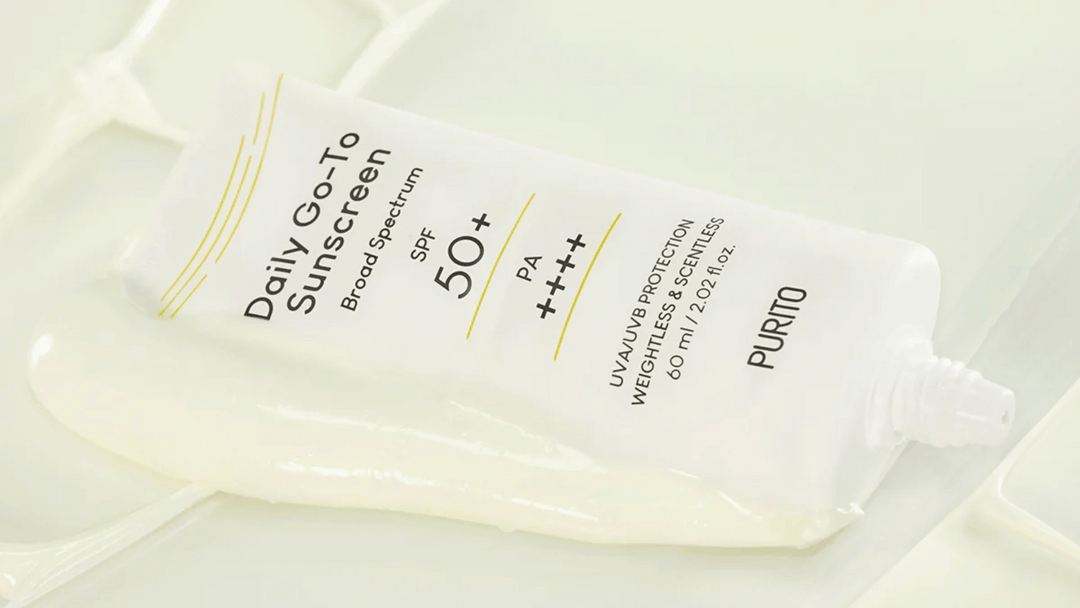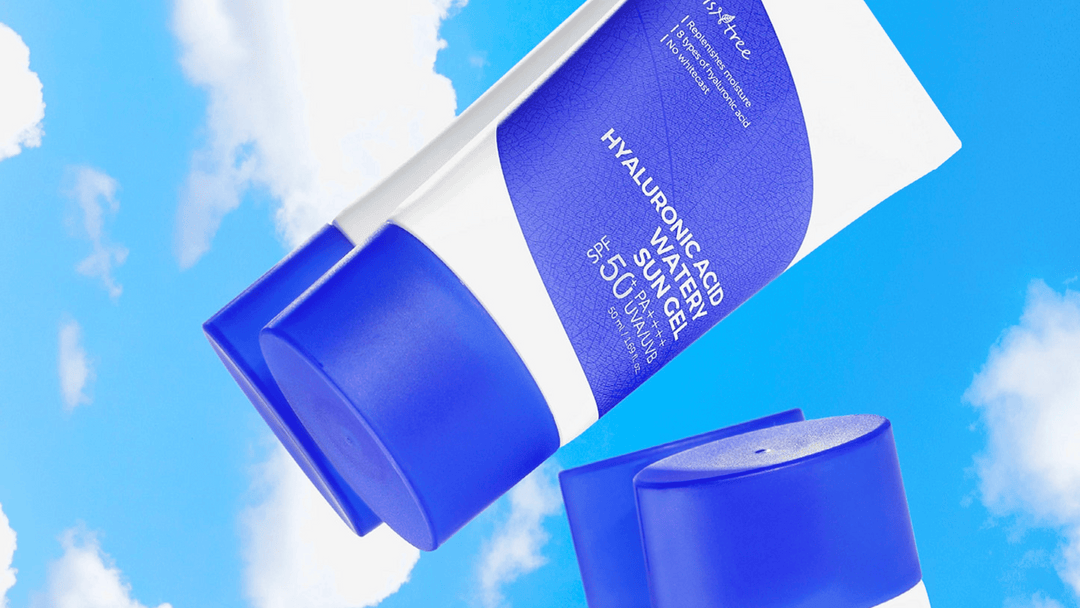
Sun protection & sunscreen
Korean sunscreen products are known for their high-quality and innovative formulations that effectively protect against both UVA and UVB rays. These sunscreens are light on the skin and provide a soft finish without leaving a white film or feeling sticky. Many contain nurturing ingredients such as aloe vera, which is soothing and moisturizing, making them ideal for all skin types, including sensitive and acne-prone skin. The products come in various forms like gel, cream, and stick, allowing for personal customization according to skin needs.
What is sunscreen?
Sunscreen is a product applied to the skin to protect it from harmful UV rays from the sun. There are two types of rays that can damage the skin: UVA and UVB. UVA rays penetrate deep into the skin layers and can lead to aging and wrinkles, while UVB rays cause sunburn and increase the risk of skin cancer.
What is special about Korean sunscreen?
Korean sunscreen differs from Western products due to its advanced formulations and focus on skincare. These products often contain ingredients that promote moisture balance and skin health, such as green tea extracts and aloe vera. Moreover, they are specially formulated to give the skin a light and non-greasy feel, which has made them popular worldwide.
What type of sunscreen should I use?
There are two main types of sunscreen products: chemical and physical. Chemical sunscreens contain ingredients that absorb the sun's rays, while physical sunscreens use minerals to reflect them.
What is physical sunscreen?
Physical sunscreen, also known as mineral-based sunscreen, consists of ingredients such as titanium dioxide and zinc oxide. These minerals create a protective barrier on the skin and effectively reflect both UVA and UVB rays. Hence, they are an excellent choice for people with sensitive skin or allergies who need a gentle and effective sunscreen.
What is chemical sunscreen?
Chemical sunscreens contain active ingredients that absorb the sun's rays and convert them to heat energy, which is then dispersed from the skin. These types of sunscreen products may be more suitable for people with oily skin as they do not leave a white film on the skin. It is important to note that chemical sunscreens often contain several different active ingredients to protect against both UVA and UVB rays.
What type of sunscreen should I choose?
It depends on your skin type and needs. If you have sensitive skin or allergies, a physical sunscreen might be the best choice as they do not contain any potentially irritating chemicals. If you have oily skin or prefer a lighter formula, a chemical sunscreen might suit you better. You can also use both types of sunscreen to get maximum protection.
Combining physical and chemical sunscreen
Some people choose to combine both physical and chemical sunscreens to achieve better coverage. This can be especially useful if you are in strong sunlight or plan to be outdoors for an extended period. By using both types of sunscreen, you get a broader spectrum of protection against both UVA and UVB rays.
How do the protection levels in Korean sunscreens differ?
In Korea, the PA system is used alongside SPF to measure protection levels against UVA and UVB rays. SPF (Sun Protection Factor) measures protection against UVB rays that cause sunburn, while PA (Protection Grade of UVA) indicates the protection level against UVA rays that can lead to premature aging. Korean sunscreens, which often have high PA values, provide comprehensive protection.
What are the most popular ingredients in Korean sunscreen?
Korean sunscreens are known for containing innovative and skin-friendly ingredients. Some of the most popular include niacinamide, which improves skin elasticity and reduces wrinkles; centella asiatica, which soothes irritated skin; and hyaluronic acid, which intensely moisturizes. These ingredients support the skin's natural barrier and contribute to a healthy skin tone.
How should sunscreen be applied for best effect?
To maximize the protection from a Korean sunscreen, it is important to apply it correctly. The product should be applied generously to all exposed skin areas about 20-30 minutes before going out in the sun. This gives the active ingredients enough time to absorb and start working. Reapplication should occur every two to three hours, especially after swimming or if you sweat a lot.
Which skin types are best suited for Korean sunscreens?
Korean sunscreens are designed to accommodate a variety of skin types, including sensitive skin, thanks to their gentle formulations. They are available in different forms, such as gel, cream, and mist, making them adaptable for different needs. People with oily skin might prefer gel-based sunscreens that do not clog pores, while those with dry skin might benefit from creamy formulations that also moisturize.
What innovations in Korean sunscreens can we expect in the future?
Future Korean sunscreens are expected to integrate even more advanced technology to improve protection and user comfort. Innovations may include the development of new UV filters that provide longer and stronger protection, as well as sunscreens that adapt to the skin's needs depending on environmental factors like the sun's intensity and humidity. Furthermore, the trend towards more sustainable and environmentally friendly products is likely to continue to grow.
How do you choose the right SPF level in sunscreen?
The choice of SPF level in a Korean sunscreen should be based on your skin type, the environment you are in, and how long you plan to be out in the sun. Generally, a higher SPF is recommended for people with lighter skin tones or those who are in strongly sunny environments. An SPF of at least 30 is recommended for daily use, while SPF 50 or higher may be suitable for longer stays in direct sunlight.
Can sunscreen be used year-round?
Yes, it is important to use sunscreen year-round, not just during the summer months. UV rays from the sun can be harmful even on cloudy days or during the winter when the sun does not feel as strong. Korean sunscreens are often formulated to be light and comfortable on the skin, making them ideal for daily use regardless of the season. This helps protect the skin from premature aging and other damage caused by UV rays.
How does sunscreen affect makeup?
Korean sunscreens are designed to be compatible with makeup, and many products work excellently as a primer under foundation. They are quickly absorbed by the skin and leave a soft and non-greasy surface, which facilitates the application of makeup. However, it is important to allow the sunscreen to be fully absorbed before makeup is applied to avoid the makeup moving or not adhering properly.
What are the latest trends in Korean sunscreens?
The latest trends in Korean sunscreens include the development of water-resistant formulations that are ideal for active outdoor activities and water sports. Additionally, there is an increasing trend towards multifunctional products that combine sunscreen with skincare benefits such as anti-aging and pigment reduction. The innovation also continues with a focus on natural and organic ingredients that support both skin health and the environment.
What role does SPF play in the skin aging process?
SPF (Sun Protection Factor) in sunscreen plays a crucial role in protecting the skin from UVB rays, which not only cause sunburn but also contribute to premature skin aging, such as wrinkles and sun spots. By regularly using a sunscreen with a high SPF, you can significantly reduce these effects. It is an effective way to preserve the skin's youthfulness and prevent photoaging.
Can Korean sunscreens contribute to improved skin tone?
Yes, many Korean sunscreens contain ingredients that not only protect against the sun but also contribute to a more even skin tone. Ingredients like niacinamide and vitamin C can brighten skin tone and reduce the visibility of pigment spots. These products can thus not only protect your skin from the harmful effects of the sun but also improve its overall appearance and luster.
What ingredients should be avoided in sunscreen products?
When choosing sunscreen products, it is important to be aware of certain ingredients that can be harmful to both health and the environment. Oxybenzone and octinoxate are two common UV filters that have been linked to hormone disruptions and damage to marine ecosystems, including coral bleaching. It is recommended to choose products labeled as "reef-safe" and that use mineral-based UV filters like zinc oxide and titanium dioxide, which are considered safer alternatives.
What is the difference between SPF 30 and 50?
SPF stands for Sun Protection Factor and indicates how long the product protects your skin from the sun's UVB rays. An SPF 30 provides an average of 97% protection while an SPF 50 provides 98% protection. Thus, there is a minimal difference between the two, but many experts recommend using at least an SPF 30 for best protection against the sun. Remember that regardless of which SPF you choose, it is important to apply regularly and generously to get full protection.
How long can you stay in the sun with SPF 50?
There is no specific time interval for how long you can stay in the sun with SPF 50, as it depends on several factors such as skin type, the sun's intensity, and activities being performed. However, an SPF 50 provides higher protection than a lower SPF and is therefore recommended if you plan to spend a longer time in direct sunlight or during activities where sweating or bathing can reduce the effectiveness of the sunscreen. Also, remember that even with a high SPF, it is important to seek shade regularly and avoid being in the sun during the strongest hours of the day.
How much SPF should be used on the face?
Having a higher SPF on the face is particularly important as the skin there is thinner and more sensitive to the sun's harmful rays. Generally, it is recommended to use an SPF of at least 30 on the face, but if you have very light or sensitive skin, it may be good to choose an even higher SPF. You may also consider using a special face cream that contains sunscreen for extra protection.
How often should sunscreen be used?
This depends on several factors, such as your skin type, activities during the day, and how much you sweat or swim. Generally, it is recommended to apply sunscreen at least every two hours when you are out in the sun. If you are extra active or spend a lot of time in water, it may need to be renewed even more often. It is also important to remember that even if a product has a high SPF, it does not mean it will be effective all day. Regularly applying more sunscreen is the best way to stay protected against the sun's harmful rays.
What are the most common mistakes when using sunscreen?
The most common mistakes include not using enough sunscreen, not reapplying after swimming or sweating, and using an old or expired product. For sunscreen to be effective, a generous amount should be applied evenly over all parts of the body that are exposed to the sun, and it should be reapplied every two to three hours on sunny days.
Closing thoughts
Korean sunscreen products not only offer highly effective protection against the sun's harmful rays but also improve the overall health and appearance of the skin, making them an excellent choice for those seeking both protection and beauty care.







